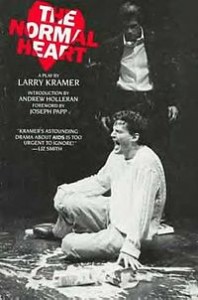Looking Back on ‘The Normal Heart,’ and Patients’ Activisim
A few weeks ago I saw The Normal Heart, a play about the early, unfolding AIDS epidemic in NYC and founding of the Gay Men’s Health Crisis. The semi-autobiographical and now essentially historical work by Larry Kramer first opened at the Public Theater in 1985.

The story takes on the perspective of a young man who’s seeing the death of too many of his friends and neighbors from a strange and previously-unknown disease. As much as the situation is disturbing, and frightening, and shattering of the gay men’s barely decade-old freedom to behave as they choose, most of the protagonist’s associates just can’t deal with it. Nor can other, potentially sympathetic officials like Mayor Koch, health officials at the CDC and NIH.
Among the men who form GMHC, in this drama, there’s a mixed crew. Some say they’re embarrassed by the attention the illness drew to some gay men’s behavior. Many stay fully or half-closeted, understandably insecure in their jobs. They worry about discrimination and rejection by families, landlords and even doctors, some who were reluctant to take on patients with this disease. Some of the affected men and their friends, straightforwardly, fear death; others are in plain denial about what’s going on in their community.
The scenes unfold between 1981 and 1984, more or less the time when I moved to Manhattan, lived downtown, applied and matriculated at NYU’s medical school. Many of the first clinical cases, i.e. patients, I saw, were young men with HIV and Kaposi’s sarcoma, one of the first conditions associated with the outbreak and that’s featured in the play – the appearance of maroon or violet-colored, usually but not always flat, often elongate, spots on the skin. The AIDS patients tended to have anemia, either from immune blood disorders or, more often, infection in the bone marrow. As a hematologist-to-be, I was intrigued.
Then and now, looking back, it’s hard not to respect those men’s activism, especially those who, with Kramer, created the AIDS Coalition to Unleash Power (ACT UP). They were impatient with the pace of research and physicians’ protocols, and spoke out so emphatically about their needs: for more research; for prevention and treatment; for easier access to new drugs; and, simply, for good medical care.
The play closes soon in New York; its producers are said to be planning a tour and a London production of the work. Patients and their advocates, of all backgrounds and particular concerns, might take notes.
—
Leave a Reply